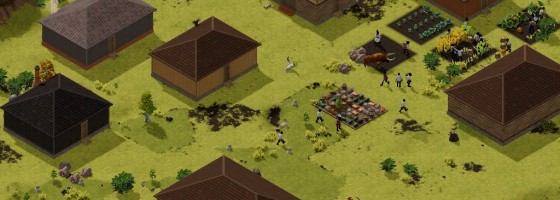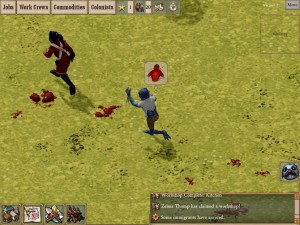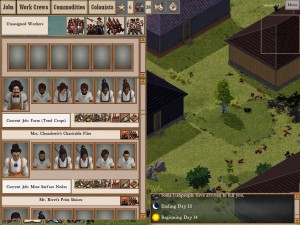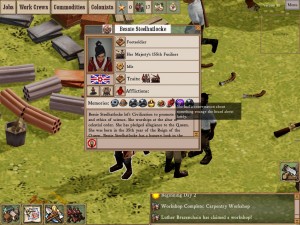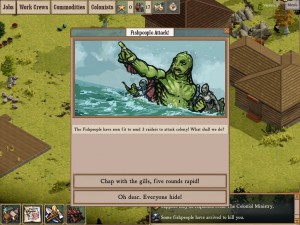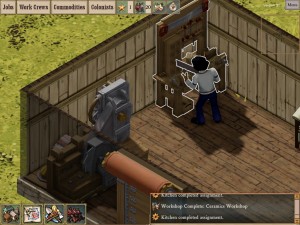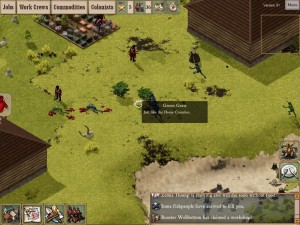Clockwork Empires: The Lovecraft steampunk city builder from Gaslamp Games has been on my radar since the first announcement. They’ve recently had their own version of early access dubbed Earliest Access for fans to get the first version of it. Since then the developers have moved onto Steam’s early access as they continue to work on the game. While it’s still a ways out, I had a chance to talk to Gaslamp Games about the development of it and the studio.
The following interview was done with David Baumgart of Gaslamp Games.
1. First off for people who may not know about Gaslamp Games, could you tell us briefly about how Gaslamp was started and what types of games you guys like to make?
We started off as a bunch of guys working in a basement. I knew a guy who knew a girl who knew a guy looking for an artist and that’s how I ended up working with the group that eventually became Gaslamp Games. I was even the second or third artist brought on; the other two disappeared at various points for various silly reasons.
Back then in 2008 there was no money, no one had any idea what they were doing, much less what we were doing together, and when I was brought in they were trying to make some kind of Final Fantasy Tactics game. I wasn’t really into the idea, but getting paid sounded good. And you know what? I never did end up getting paid for that first game.
It crashed and burned under the weight of our own incompetence, which is probably an experience everyone deserves to go through. Interestingly, this first failed game was called “Clockwork Fantasia” which draws a distinct thematic continuity with what eventually became “Clockwork Empires”. Anyway, once that game imploded, Nicholas said he had this rogue-like project kicking around that we could polish up in three months to make some money to make the game we really wanted to make. Three years later we released Dungeons of Dredmor on Steam.
As for what types of games we like to make, I’m sure we’d all give completely different answers. I have a particular love of strategy and simulation but could be persuaded to do lots of different things depending on the artistic angle. I think this variety of perspectives among the founding partners of Gaslamp explains a lot about what we end up making.
2. Gaslamp was one of a few indie developers to really hit it off with your first game: Dungeons of Dredmor. Given the popularity of it, what led you guys to move to a completely different genre and style with Clockwork Empires?
We did well with Dredmor, but probably an order of magnitude and a half below the real A-grade indies. It was exceptional nonetheless in an age before indies were truly welcome on Steam and that success felt very nice after several years of being a starving game-artist after I graduated from art school. I think we all dealt with some form of imposter syndrome for a year and a half after the release of Dredmor in 2011.
As for moving on from Dredmor, well, it’s just fun to do something completely different. I have a list as long as my arm for what I’d do if I were to make Dredmor 2, and I’m sure all the partners do, but it just wouldn’t be as interesting to retread old ground. And if we did that we’d just be “those guys that make Dredmor”. That said, you can see the roots of Clockwork Empires in Dredmor. There were lots of Steampunk and Cosmic Horror elements from the start, even some explicit references to the fiction of Clockwork Empires in one of the expansion packs added in once we were pretty sure we knew what we were doing next.
Anyway, I do what I do because I want to make interesting stuff, try different things, be challenged, and be ambitious. Re-hashing the same material is too obvious.
That said, the bills must be paid, and we’re not totally the badass hotshots we may like to think we are, so perhaps we’d have done an easy sequel had Dredmor been somewhat less successful than it was.
3. Before we talk about gameplay, there are two interesting parts of Clockwork Empires’ development that I want to touch on. First is with the often debated area of early access. Gaslamp decided to go one step further and release an even earlier version of Clockwork Empires for people to buy and check out, AKA earliest access.
Given the often polarized nature of early access titles, what led you guys to release an earliest access version of the game for people to buy?
Early Access makes everything easier for us in every way by having a soft, gradual launch. Doing the “Earliest Access” with emphasis on “Earliest” was just some fun with what we called the thing plus an additional even softer first step into the public that made the experience even more gradual.
It saw the game released to only the very hardcore fans who we knew would be patient with the state of things. Building from there, Early Access has allowed us to discover what would be required from ourselves personally and from our business infrastructure what we’d need to handle communication, feedback, internal testing, public perception, and even things like sales projections of the game. This gradual process of increasing scope has let us smoothly scale our efforts and learn from any mistakes made before they’d become truly expensive.
When we launched Dungeons of Dredmor to the public on Steam we were hit with the Eye of Sauron, imposter syndrome, and something we simply call “The Year With No Christmas” all at once due to the shock of huge success with no idea what that would entail. This time around, we’re trying to anticipate every possible contingency. We knew that we knew nothing, so we were very careful and took a cautious, empirical approach to everything we did.
I think this approach to business development is largely Daniel’s credit as he’s taken on the CEO position with absolutely no business experience — but he does have a background in physics so I think he treats it like a science problem.
Clockwork Empires is a big project and a complex game, and easing ourselves into public release lets us test, evaluate, and then re-test. It seems to be working.
4. And building from that, were there any lessons or mistakes you saw other indie developers who went the early access route made that influenced Gaslamp’s decision to go earliest access?
I think Sunless Sea and the initial launches of Starbound and Spacebase DF9 offered positive examples to model aspects of our strategy on. Most especially they showed a clear route of progress and communicated where things are going and how things are coming along. Even Dwarf Fortresses’ “Future of the Fortress” is an example that made a great impression on me as a statement of intent years before we even thought of Clockwork Empires. It’s all about communication!
There are, er, a few examples of Early Access gone terribly wrong to take lessons of what not to do from as well. Heck, my experience working with contractors as an art director sort of sums it up: it’s better to be communicative about the real state of affairs than it is to say nothing and try to hide from responsibility for being late on what you’ve promised.
People appreciate being given the respect of being told the truth. This also happens to be the ethical thing to do anyway, so win-win!
5. The second point has to do with the pricing. Indie developers are facing a lot of different market pressures regarding pricing their game these days: Sales, market trends, mobile games and so on. You guys have gone on record saying that Clockwork Empires will be $30 now and at launch with exception to any sales.
What kind of research did you guys do to decide on that price and were you considering any other price points during development?
We considered the range of prices by looking at what small indie city simulation games, say Banished, were priced at versus other examples up to the single-A developer city-builders like Tropico, or even Anno. The question was, what is Clockwork Empires going to look like at the end of development? What is the difference between our game and theirs, what is the history of our studio versus theirs? What does our “brand” look like versus theirs?
Then we also asked other developers, a few trusted members of our fan community, and distributors for input as well. What did it look like Clockwork Empires would be and why? What has our messaging led people to believe we’re going to be selling? And then we asked ourselves how those answers aligned with what we thought Clockwork Empires would look like as a finished product, and why that might be a different answer from what others thought it would be.
In the end, we’re happy with the price. There are complaints that it should be lower due to being an incomplete game but we intentionally did not want people to feel like that had to get in early to get a good deal.
Because if they’re just buying to game early to pay less for it, they’re not doing it because they want to play Early Access, it’s just a way to save money, and that’s not the point!
6. With that said, let’s get into the gameplay of Clockwork Empires. From impressions and trailer footage, CE draws from different genres and styles. Are you guys skewing more towards hardcore fans of the genre or will there be elements in there for someone who has never touched a city builder before?
I think it’ll end up like Dredmor, which looked casual but had some pretty complex mechanics operating underneath the silly exterior. I personally love hardcore strategy games but my patience with micromanagement has dwindled as I’ve gotten older, and I know the other Gaslamp partners are more interested in other aspects such as procedural narrative or simply having cool monsters.
When we started designing Clockwork Empires, we said, alright: There are many types of players and we need to give each type something. The explorer wants to find neat new stuff, the optimizer wants to create a perfect machine, the builder wants to design an adorable perfectly decorated town, and the fighter wants to kick lots of ass and build a huge fort, and so on.
As we proceed through development we evaluate our overall design and try to include stuff that appeals to each type of player. And in terms of mechanics, we want to reward a player who focuses on their interest in a way that appeals to them while at the same time being forgiving of their lack of interest in other areas.
Trying to make everyone happy is a tall order, but it’s important to us to try. If I were to sum it up way too succinctly in a way that does disservice to every party involved, “Clockwork Empires aims to do with Dwarf Fortress what Dungeons of Dredmor did with Roguelikes”.
7. One of the challenges of the city builder genre has to do with replayability. Because of optimization, it’s very easy to build one perfect city and be done with the game due to not having any other goals or challenges to achieve. Is Gaslamp taking any steps to keep things from getting repetitive?
Our goal is absolutely replayability over linearity! We are even intentionally designing for mechanics that create instability. It is essential to us however that this instability not take the form of whack-a-mole micromanagement or tornadoes coming out of the sky without warning; everything should be the consequence of decisions previously made – or decisions intentionally not made.
For example, as a colony gains population, new opportunities arise for instability. Having more people leads to more mundane interpersonal conflicts like relationship jealously (which isn’t modeled yet, sadly) to the formation of cults that conspire to build shrines, murder upstanding colonists, and summon monsters (which is modeled; priorities, you know?).
In this early stage of development, to offer a military challenge we simply ramp up the size of the periodic Fishperson attacks as your population increases. It’s a crude example, but it serves to show where we want to go with scaling challenges — with the provision that they should never feel static.
I don’t think they’ll be static anyway due to how scaling number of agents has nonlinear effects in our simulation. (And I draw from a personal frustration here in response to the static-feeling difficulty scaling in Oblivion, if anyone still remembers that one.)
8. And continuing from that question, one of the major themes of Clockwork Empires is the Lovecraft influence. Besides trailers and blog posts, there hasn’t been too much revealed about the Lovecraft elements. In terms of design, is the meddling of the Elder Gods viewed as an additional mechanic, a lost state or something in between?
A couple of the top requests we hear from players are “I want to let the cults take over my colony and see what happen” and “I don’t want to fight the Fishpeople, I want to work with them”. We think these are both really cool possibilities, though they certainly shouldn’t be easy paths to take. Designing monsters is a lot of fun but we’re intentionally coy with reveals. It’d ruin the surprise if we just gave away all the details, and besides, Cosmic Horror is all about alien forces which have incomprehensible motives and power.
So, yes, eldritch elements are absolutely a core part of Clockwork Empires that results in generally negative results to humans who value not having tentacles sprouting of the ground/houses/people and other rather unstable but interesting effects. Some people want different things, of course, and we’re open minded.
9. From screenshots and footage, Clockwork Empires also draws similarities to Dwarf Fortress in how citizens function and react. Are you guys aiming for the player to be focused on micro management or macro management of their colonies for the completed version’s gameplay?
Now this is a fine balancing act! We’re on the one hand creating an extremely baroque game and on the other doing everything we can to avoid tedious micromanagement. It would be so easy to overload the player with detail, and Dwarf Fortress certainly does, though the goal of Dwarf Fortress is less “make a game for players” and more “whatever Tarn Adams wants”. This is fascinating, but not particularly playable or marketable as a product by a company with employees to pay. So we do want to make the experience a little more accessible, but still have depth.
And we do want to reduce micromanagement as much as possible. We want to cut out the ability for players to optimize the game by boring themselves to death – a problem observed very nicely by Soren Johnson in his “Water Finds A Crack” blogpost.
We also want to avoid making players make the same decision again and again ad nauseam: don’t make every decision, make policy which your colonists follow. Though with that said, there are some decisions that are interesting enough that we want to allow the player to make them personally, designing buildings for example.
10. Victory conditions are another element of city builder design and also goes with the previous question on optimizing your city. Will there be goals to achieve/campaign mode or will the game be focused entirely on free form or sandbox play?
There are essentially two end states in Clockwork Empires: everyone is dead so there are no agents to carry out (or ignore) your commands or you elect to start a new colony. We’re not interested in a game where you must complete a linear set of objectives and if you fail be forced to start over. It’s far more interesting to receive a mission from, say, The Queen to send 50 units of tinned cabbage back to the Capital, fail, then see what interesting consequences result from the fallout from that failure.
We have a line for this: “A gameplay failure can be a narrative success”. Say you send a squad of brave soldiers to fight the Fishpeople and they get completely wiped out. In one type of game, that’s where you reload. In Clockwork Empires we want an event to fire wherein the Empire Veterans Legion organizes a charity drive in The Capital to fund your construction of a monument to those brave soldiers. Once built, colonists will stop by from time to time in front of the monument and generate pleasant memories of how brave and loyal those soldiers were.
Then perhaps a poet will write a poem commemorating their sacrifice – Charge of the Light Brigade, basically. This may have all started from an utter failure, but there are so many interesting opportunities to pick up from that failure!
We want Clockwork Empires to be about the fascinating consequences to whatever happens even if it’s an utter mess of mismanagement and cannibalism.
When it comes down to it, after you build your SimCity and it’s perfect and everyone is happy, what do you do? Drop a monster on it. Watch it burn! We want to make that a significant part of the game too.
11. Impressions of Clockwork Empires have been across the board favorable between earliest and early access. Besides the work with getting save/load functionality to work, what’s the biggest system or mechanic that you guys think will change how the game is played once it’s implemented?
To be fair, I wouldn’t say that all impressions have been favorable, but then it’s classically self-critical developer behavior to only see the negative things people say.
I think reactions are a lot to do with what expectations people have from a game labeled “Early Access”. Some people expected exactly what they got while some clearly expected a game that was further along in development and they let us know how they felt about it. I think it would be fair to say that reactions to what people think Clockwork Empires will be have been “across the board favorable” – there’s no question that the vision for the game has wide appeal, which is great!
The skepticism is to do with whether we can accomplish that vision. Such skepticism is entirely natural but we have observed it’s generally based on people’s experience with prominent Early Access failures rather than experience with Gaslamp Games. We want to get this right!
As for big features, there’s an awful lot to come. And every time we drop a far-reaching system into the game, it necessarily wreaks glorious havoc with balance which, honestly, is kinda fun. It keeps development from being boring! I think we see the first few months of Early Access involving putting a first iteration of the major systems into the game, then from there those major features will get slowly iterated, expanded, and improved in response to player feedback. Sometimes more massive overhauls are needed for systems which simply don’t work or are otherwise limited, and that’s fine too.
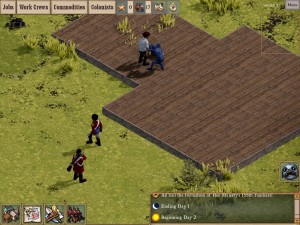
Getting people to stay on task can be tricky at the moment as they tend to switch gears pretty easily.
For the next month – October’s update – we want to start fleshing the economy out to give a meaningful sense of progress in buildings and machines and the products they create, and allow the player to do a little more with advanced infrastructure.
Right now you pretty much just build a bunch of shacks with a fairly flat economic progression. Once we’re done, there should be a sense of progress – maybe not to the ultimate depth of the game, but the system should be in place to show where it’s going.
12. And lastly for now, has Gaslamp thought about expansion or post release content for Clockwork Empires? Or are things still too early to be thinking about that?
We’ve definitely thought about it! It’s natural to think about what sort of crazy things we could do within the scope of a proper expansion pack, things that are serious effort, really cool, but not promised or expected within the scope of the core game. It would of course be completely irresponsible for me to give any details about what we’ve discussed as its all pretty wild speculation at this point anyway.
I would however not be surprised if our post-release follow-through looked something like what we did for Dungeons of Dredmor.
Thanks for taking the time to answer these questions and good luck with Clockwork Empires

